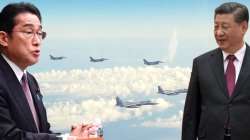Japan launches biggest military build-up since World War II amid fears of being targeted by China, North Korea
Japan national security strategy: Tokyo on Friday unveiled the biggest shift in its security plan by adopting a national security strategy amid fears of being targetted by China and North Korea.

Japan national security strategy: In a major development, Japan on Friday unveiled the biggest shift in its security plan by adopting a national security strategy amid fears of being targeted by China and North Korea. The new plan, which Japan called one of the biggest shifts since World War II, includes preemptive strike capability and cruise missiles to the security system. According to the readout of the strategy revealed on Friday, Japan has been facing direct threats from Russia, China and North Korea and termed it "the severest and most complicated national security environment since the end of the war".
The document categorically mentioned Beijing as "the biggest strategic challenge" and added it is the vision of Tokyo to ensure peace and tranquillity in the country by deploying cruise missiles and other lethal weapons. Addressing a press conference, Prime Minister Fumio Kishida called it the biggest change in order to dis“When threats become reality, can the Self-Defense Force fully protect our country? Frankly speaking, the current (SDF capability) is insufficient,” Kishida said. Under the strategy, Japan’s defence spending through 2027 will increase to about 2% of Japan’s GDP to total some 43 trillion yen ($320 billion), 1.6 times that of the current five-year total.
Kishida said the new target sets the NATO standard for defence spending, a budget increase that has been his policy priority since taking office in October 2021.
Why Japan has made a significant change in the national security policy?Because of its wartime past as an aggressor and national devastation after its defeat, Japan’s postwar policy prioritized economic growth while keeping its security light by relying on American troops stationed in Japan under their bilateral security agreement. Japan’s defence buildup has long been considered a sensitive issue at home and in the region, especially for Asian victims of Japanese wartime atrocities.
But experts say China’s growing influence, Russia’s invasion of Ukraine and fear of the Taiwan emergency prompted many Japanese to support increased capability and spending. “Taiwan emergency and Japan emergency are inseparable,” said Ken Jimbo, a defence expert at Keio University, noting that Japan’s westernmost island of Yonaguni is only 110 kilometres (70 miles) away from Taiwan.
Rapid advancement of missiles have become “realistic threats” in the region, making interception by existing missile defense systems more difficult, the strategy said. North Korea fired more than 30 ballistic missiles this year, including one that flew over Japan. China fired five ballistic missiles into waters near Japanese southern islands including Okinawa.
China responds
Chinese Foreign Ministry spokesperson Wang Wenbin reiterated accusations Japan was “ignoring facts, deviating from its commitment to China-Japan relations and the common understandings between the two countries, and groundlessly discrediting China.” “Hyping up the so-called China threat to find an excuse for its military build-up is doomed to fail,” Wang said Friday at a daily news briefing.
(With inputs from AP)

